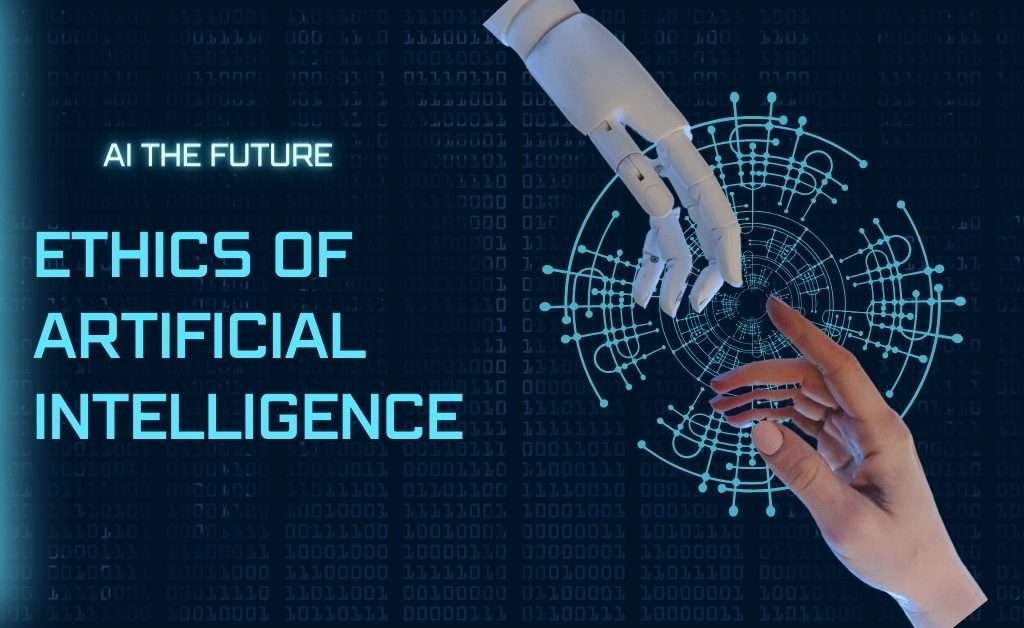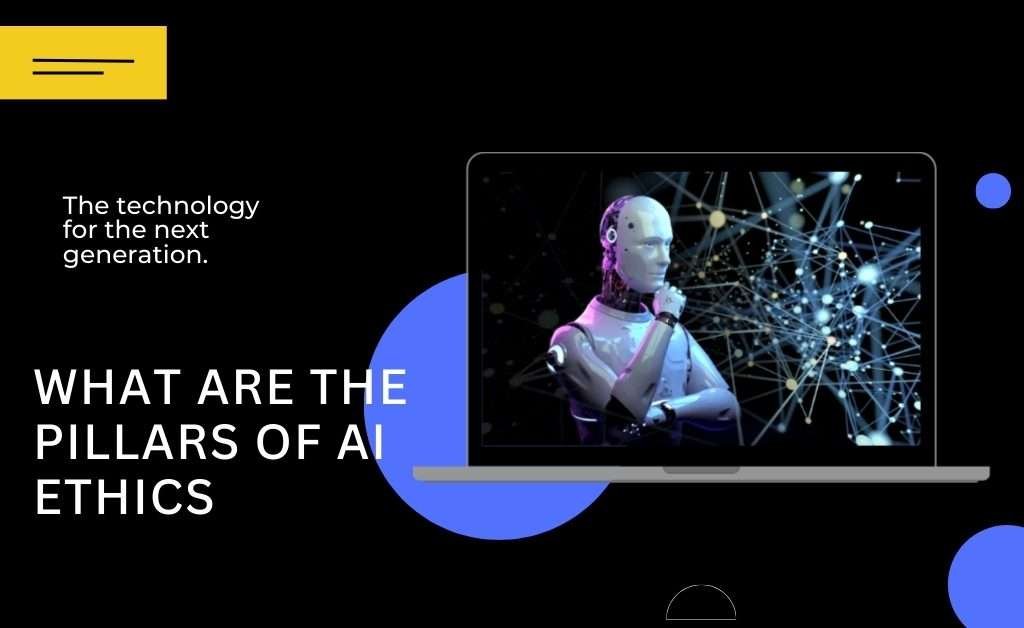In the midst of the breakneck pace of our technological development, AI comes to the fore as a revolutionary emperor of the landscape, ready to change many different parts of our lifestyles. From making personal recommendations on streaming sites to using advanced AI-powered vehicles, systems of the type AI become more and more important in our daily life. Nonetheless, the joining of human forces and machines appears to be giving the birth to the key ethical issue that should not be ignored when AI implementation is considered. The ethical issues concerning AI is the issue this study covers in depth, discussing the importance and the socio-technical obstacles they pose.
A set of principles that are valuable, fair, and without bias which determines how human-like are the development and application of artificial intelligence, also refers to the rules of AI ethics. Thus, there are core grounds developed in order to secure that AI techniques are left good means to be used accordingly in terms of human values, moral duties of man, and facilitating of the society. AI ethics touches upon its aspects that covers the fairness, transparency, accountability, privacy, security and bias mitigation. AI ethics in dealing with hidden biases in algorithms, data privacy issues, potential for mass unemployment caused by the automation, and the perpetuation of societal biases done by AI systems are the main challenges being addressed by this area of study. AI ethics, in a nutshell, is an effort to rationalize AI technology immense potentiality with the ethical considerations and social impact consequences that its mass dissemination results in.

Ethics of Artificial Intelligence
AI ethics is a wide concept which includes the moral judgment of any questions in relation to the appropriateness of artificial intelligence development, deployment and usage. The concerned questions arise through the innovative abilities and the pressing impact of the AI systems on people, societies and the environment.
Here are some key aspects of the ethics of artificial intelligence:Here are some key aspects of the ethics of artificial intelligence:
Fairness and Bias:
Bias in a human system is passed to AI machine learning systems that can either amplify inherent bias in data sets or replicate such bias. Accordingly, ethics to be considered are those that guarantee impartiality of the decision-making process and a fair environment deprived of any discrimination against some individuals or groups.
Transparency and Accountability:
Transparency in this case means that people will be able to cast light on how the AI system comes about its decision making. Accountability deals with deciding who is responsible for the outcome of AI systems, if they happen to perform, a harmful result or involve irresponsible behavior. An ethical AI is rather established on transparency, procedures in place for accountability for AI developers, operators and users in reference to their actions and decisions.
Privacy and Data Protection:
AI expansions constantly feed on huge amounts of data, so this gives rise to privacy policy breaches and data safety. Ethics recommendations are for strong privacy protection and informed consent, information transparency in data processing, in order to keep the human rights from the violation.
Security and Safety:
Providing the security and safety of industrial AI systems should be a top priority for this purpose and makes sure that the system will not be manipulated, attacked or used in a misleading situation which can cause damage or physical injury. The ethical issues include the effective implementation of cybersecurity, assessing risks, and considering the security of AI design and deployment of AI to begin with.
Human Autonomy and Control
Ethical AI design stands for the human-centric approach that provides an opportunity for human beings to control the autonomous systems and to exert dominion over the decision-making process. The purpose of this principle is to prevent justication for the end user’s decision that is made by AI systems especially at the critical areas such as health care, justice system, and autonomous devices.
Social and Economic Impacts:
Ethical considerations, however, go further than the technical aspects and include other factors such as the broader society implications and economic impacts in relation to the AI deployment. Ethicists examine the problems related to automation of job positions resulting in message employment, economic inequality and issues with the reallocation of the power and wealth in the process of critical AI growth directions.
Environmental Sustainability:
The ecological implications of AI technologies, including electric energy utilization and greenhouse gas emissions associated with training and running Artificial Intelligence models can be considered as one more ethical issue here. Ethical AI practices embed reducing ecological burden and attaining a green business ethos into the process.
Global Governance and Collaboration:
Resolving the ethical problems of AI likewise necessitates international cooperation, universal governance plans and cultural communication among cultures. Ethical foundations have to be equally valid for all countries so that AI technology can be created for the benefit of the whole humankind while conserving distinct traditions and norms.
The subject of the ethics of artificial intelligence, however, is largely an effort at making sure that we develop and apply AI to bring about ethical solutions and be of benefit to society. By including ethics into AI research, development and policy making processes will make us to take the world into revolution and then to have minimum possible risks and to secure human values and rights.

What are the pillars of AI ethics
AI ethics pillars are pointed at the core principles and values which set the ground for a trustworthy artificial intelligence technology development, usage, and adoption. Although the frameworks might be different in the way they put the pillars in certain terms, they would still represent main ethical considerations and moral foundations. Here are the common pillars of AI ethics:Here are the common pillars of AI ethics:
Fairness:
Equity, on the other hand, stipulates equal treatment of people and groups, ensuring that AI systems do not develop biases or imprint them upon the members of a community, displaying inequality based on the criteria such as race, gender, nationality, religion, or level of education. Ethical AI aims for a minimal impact of the biased algorithm and ensures an equally high standard for every stakeholder.
Transparency:
Transcendence implies that AI system is being understandable and actually comprehensible so that decision making processes could be seen and the factors considered could be visualized. Transparent AI maintains high accountability, it builds trust among users, and it enables meaningful human-AI communication as it allows us to have insight of how the algorithms or models of AI function.
Accountability:
Accountability encompasses determining who is supposed to be in charge for those tasks and outcomes that stem from the functioning of AI systems. There will be enforcing and keeping accountable of developers, operators and other actors involved in the process of Artificial Intelligence systems and the potential harm of these technologies due to their inherent biases and possible mistakes. A clear mechanism of accountability ensures that the right path of ethical conduct is followed with AI usage without the risks related to it.
Privacy:
Due to the nature of the term, privacy covers the boundaries of knowledge that individuals set for their private data, information, and other personal details. The ethical AI standards are to guarantee the privacy rights of all involved and to implement rules like data minimization, informed consent, and secured data handling which are to assure data privacy for individuals.
Security:
Security implies preventing AI systems from being accessed by cybercriminals who could introduce threats like cyber attacks or modify them for fraudulent purposes. Ethical AI design implements in a very proper way all the vital security measures, encryption ways and data loss risk mitigation strategies in order to stop any data breaches, manipulating or taking advantage of the vulnerabilities.
Safety:
Security is all about reducing the chances of wounds or injuries through human lives or well-being that are in AI technologies are at stakes. Ethical AI architecture mainly aims at securing critical applications such as driverless vehicles, clinical diagnosis aids, industrial robots, by means of reliable testing, validation, and safety-trigger mechanisms that creates safe conditions and also protects against potential risks.
Human Autonomy:
When it comes to human autonomy, it is crucial to preserve one’s capacity of free choice and self-control in the environment where AI technologies take on a sizable role. Ethical AI safeguards human agency and users’ autonomy in decision-making processes, whereby AI systems do not violate or sway users’ choices by undue burdens or pressure, and instead recognize the right of the user to make informed decisions based on personal views and preferences.
Social and Economic Impact:
Socio-economic considerations address the rippling societal effects of implementing AI, in terms of how it influences the level of employment, inequality as well as the allocation of power and resources. According to ethical AI principles, such as equity, fairness, and creating opportunities for all, the AI should be inclusive and help to compensate for the disadvantages of socioeconomic background, class, or race, while at the same time providing equal access to the benefits of AI for different groups of the society.
Mainly the following four principles of AI ethics:
Promotion of ethical awareness, good practices and ethics in human rights, finally social well-being and minimization of harmful and harmful applications, will help stakeholders to develop AI technologies that are compatible with ethical principles, human rights, and improve society, respectively.
Conclusion
An increasing ethical problem that calls for attention in the debate about a technology development is the ethics of artificial intelligence (AI). As both AI development and AI application engender incalculable complexities, people do not just count algorithms and data—we still are human beings. AI ethics are a moral compass that sets the direction and purpose of our technological advancements, projecting fairness, transparency, and accountability amongst implementers. However, culture is itself a socio-technical problem, mixing ethnic norms with technological details. We can alleviate ethical issues, and embrace collaboration and partnership which leads to AI advancement that is beneficial in the long term for humanity.







